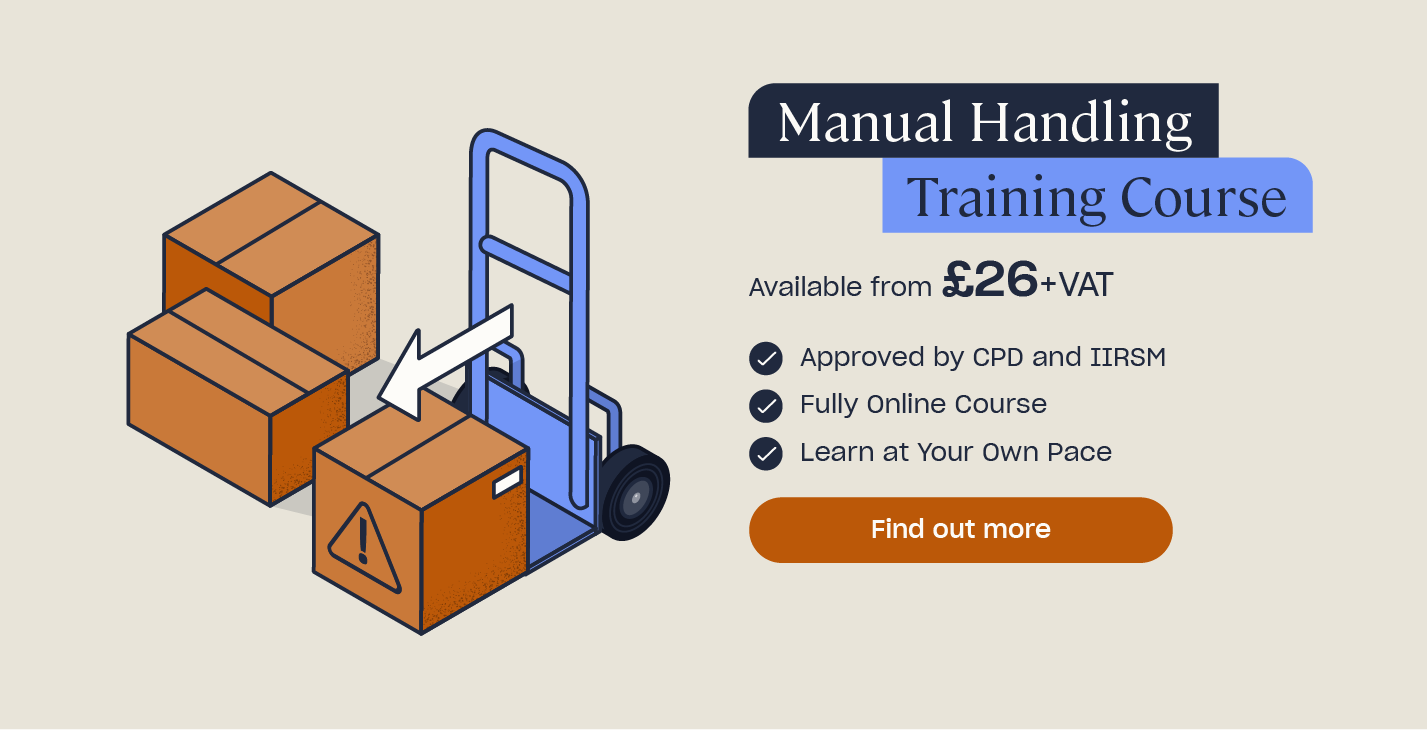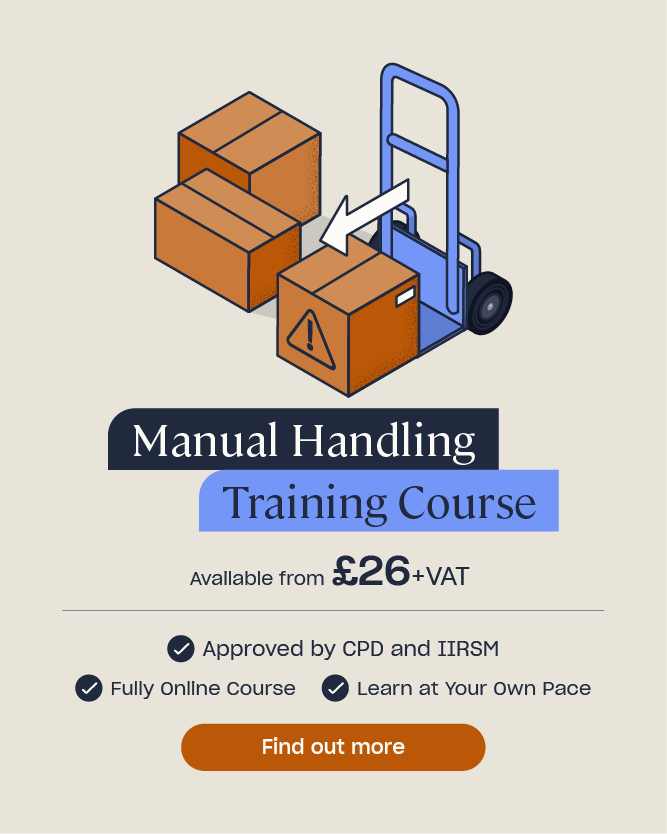What are the Consequences of Poor Manual Handling?
Activities that involve lifting, carrying, pushing, pulling, and other related manoeuvres are often inevitable at work. Machines can only do so much; sometimes we just have to utilise our own strength.
However, if not done properly, manual handling can lead to the gradual deterioration of both physical and mental health. Receiving training in proper manual handling techniques is essential. Our bodies have amazing capabilities, but also great limitations. Like machines, they’re going to develop faults and break down after long-term misuse. And when we’re worn down physically, we tend to get worn down mentally too.
Consequences of Poor Manual Handling
Consequences can be split into three main areas: short term and superficial injuries, long term injuries and mental health issues.
1. Short-term and/or superficial injuries
For example: cuts, bruises, sprains, tears, small fractures, muscle strain, etc. Usually caused by sudden and small unexpected accidents, e.g. losing grip and dropping a load, lifting an excessively heavy load at an awkward angle, or falling while carrying a load.

2. Long-term injuries
This mainly involves damage to the musculoskeletal system of the body, including muscles, tendons, bones, joints, ligaments, nerves, and blood vessels – usually caused by long-term, gradual wear-and-tear as a result of repetitive strenuous activities. These are known as musculoskeletal disorders.
3. Mental health issues
For example: long-term stress, anxiety, and depression. This is usually a negative side effect of dealing with long-term injuries that have disabling and difficult-to-manage symptoms.
Physical ailments are more readily recognised than mental health issues related to poor manual handling, but we must not overlook the fact that long-term injuries can have a serious knock-on effect: they can lead to poor mental health due to the stress and anxiety triggered by long-term physical issues.

This is why knowing how to prevent the development of both physical and mental ailments caused by bad manual handling practices is essential.
Let’s take a look at two of the more major negative consequences – musculoskeletal disorders and depression – in more detail.
Musculoskeletal Disorders
You have likely experienced or know someone who has experienced problems in the neck, upper/lower limbs, or upper/lower back, and so have first-hand knowledge of how debilitating they can be. Long-term disorders and injuries in these areas are defined as musculoskeletal disorders.

The majority of work-related musculoskeletal disorders are caused by poor manual handling practices, particularly tasks that involve:
- Heavy or awkward loads (loads may be animate e.g. people or animals, or inanimate e.g. boxes and tools).
- Twisting, turning, and bending the back, neck, or whole torso.
- Hard-to-reach areas that require stretching.
- Working in a cramped environment with unstable flooring.
You might feel like your body is tough enough to take the strain of having to occasionally adopt awkward positions, but no one’s body is built for misuse: over time it will inevitably wear down.
According to the HSE:
- Manual handling, lifting and repetitive keyboard typing are the prime causative factors behind work-related musculoskeletal disorders (WRMSDs).
- In 2022/23, the number of workers suffering from WRMSDs (new or long-standing) was an estimated 473,000. This makes it the second highest type of new and long-standing cases of work-related ill health at 27% of the total cases.
- Examples of industries that have higher rates of WRMSDs include construction, health and social work, agriculture, transportation and storage.
These statistics reveal the pervasiveness of work-related musculoskeletal disorders, particularly in relation to manual handling: the industries with higher ratings are those that require a significant amount of manual handling.

But they also reveal how enduring they are: 132,000 were new cases, meaning around 341,000 were existing cases that had yet to fully recover.
Need a Course?
Our Manual Handling Training Course will help you to understand more about the risks associated with manual handling, how to carry out a risk assessment and how to ensure appropriate control measures are put in place.
Symptoms of Musculoskeletal Disorders
Musculoskeletal disorders have numerous symptoms that range from mildly uncomfortable to severely disabling, including:
- Localised or widespread pain.
- Limited movement.
- Dull aches.
- Swelling.
- Aching or stiffness of the whole body.
- The sensation of pulled or overworked muscles.
- Fatigue.
- Disturbed sleep.
- Twitching or ‘burning’ muscles.
Many of these symptoms are difficult to manage, and make day-to-day tasks a challenge – particularly if the person has to limit or stop work activities altogether. It can completely uproot their life, especially because musculoskeletal disorders are typically long-term ailments and have slow and laborious recovery processes.

The good news is that musculoskeletal disorders take a long time to develop: repeated strain of the back over prolonged periods is what will put you at risk, not the occasional overestimation of your strength.
But the bad news is that, because it takes repeated strain, you may not notice the damage you’re doing to your body until it’s too late. Thus, preventing risk by engaging in safe manual handling practices is a necessity.
Depression
The negative mental health effects that may stem from injuries relating to manual handling must not be overlooked. Research has revealed that many workers who suffer from musculoskeletal disorders end up requiring treatment for depression.
Depression comes with a variety of extremely debilitating symptoms that, on top of the musculoskeletal disorder itself, would likely slow the person’s life down to a crawl or to a complete halt.

Symptoms of depression may include:
- Continuous low mood.
- Hopelessness.
- Lack of physical and mental energy.
- Disturbed sleep.
- Feeling helpless.
- Changes in weight or appetite (either decreased or increased).
- Feelings of uselessness.
- Low self-esteem.
- Feeling guilt-ridden.
- High levels of anxiety.
- Continuous thoughts of worry.
- High levels of irritability and intolerance.
- A severe lack of motivation or interest.
- Difficulty making decisions.
- Lack of enjoyment in life.
- Thoughts or acts of harming oneself.
- Suicidal thoughts.
Depression varies from person to person, particularly depending on what the main cause is. But in the case of musculoskeletal disorders prompted by manual handling activities, sufferers will have a great deal of overlap in terms of what type of symptoms and negative thoughts they experience. For example:
- Having hopeless thoughts that their condition will never get better.
- Thoughts of worry: thinking that everything they do will make it worse.
- Feeling useless as a result of their lack of mobility (particularly if they can’t carry out manual handling activities anymore and have to change job roles).
- Feeling like they can no longer get enjoyment out of life because they can’t engage in activities that require physical activity, e.g. sports.

The extensive lists of debilitating symptoms that come with musculoskeletal disorders and depression clearly demonstrate how poor manual handling can have serious long-term effects that stem from one another, and how important it is to make a conscious effort to adopt proper manual handling techniques.
Further Resources:
- What does TILE stand for in Manual Handling?
- Manual Handling Weight Limits: What are the Safe Lifting Guidelines and Techniques?
- Manual Handling Training: What are the Regulations?
- Manual Handling Quiz
- Manual Handling Training









